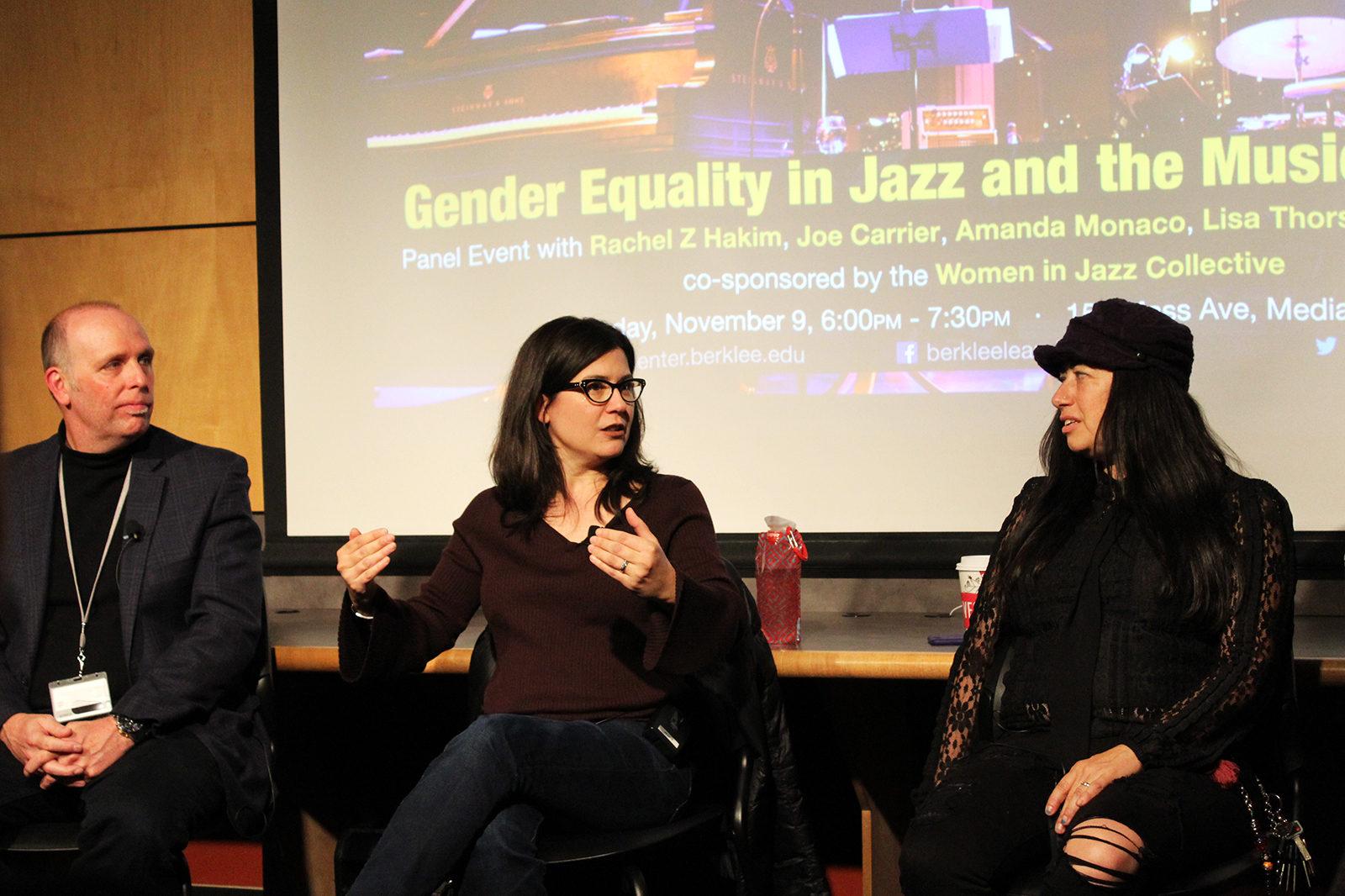In 2017, women occupied only 15 percent of the spots on Billboard’s “Power 100,” which annually ranks music industry executives by influence.
Last Thursday, “Gender Equality in Jazz and Music Industry,” a panel hosted by Berklee’s Women in Jazz Collective, discussed discrimination in the industry and explored solutions for creating gender parity.
Held at Berklee Media Center, the panel came just one day after The Boston Globe published an investigation revealing “a culture of blatant sexual harassment at Berklee.” At least three professors, the Globe reported, have left Berklee following sexual assault scandals since 2008.
Event turnout was high, with only standing room available as the panel began.
Amanda Monaco, assistant professor at Berklee, spoke about her experience studying music as an undergraduate.
“I actually had to switch colleges,” Monaco said. “The teachers were fine, but the male students destroyed me. I had to leave because of that. We are establishing boundaries. This is day one. As terrifying as it is … I feel like we’re onto something here finally.”
Lisa Thorson, a professor at Berklee, said the dialogue around inequality has shifted significantly since her undergraduate years at Boston Conservatory.
“We’re having these conversations,” Thorson said. “This makes it better. At that time, this conversation never would have taken place. Or it would have taken place in somebody’s office, and they would have said, ‘It’s not such a great thing, but we don’t want to ruffle any feathers.’ And now we can say, ‘Yeah, we’ve got to ruffle some feathers!’”
Rachel Hakim, CFO of OZmosis Media Productions, said discrimination against female performers and executives is still widespread, particularly when booking gigs. Once, Hakim said, a booking agent told her an all-female ensemble could perform but only if they wore bikinis.
Sam Spear, co-president of the Women in Jazz Collective and student at Berklee, helped organize the panel to advance discussions about gender equality in music. Her inspiration to found the collective, Spear said, came from a powerful experience playing jazz with an all-female band.
“One of my friends who played in [the band] with me said, ‘We need to keep this going somehow, not necessarily as a big band but we need to keep this kind of positive, supportive energy going,’” Spear said. “So, we decided to start a club.”
Ayn Inserto, a professor of jazz composition at Berklee, said much of the industry’s language excludes female musicians.
“It’s about the language, about the nature of what it has been and we’re trying to get rid of that,” Inserto said. “It’s definitely pervasive.”
Inserto said student attitudes in classes she teaches have been improving.
“[The students are] inclusive of one another,” Inserto said. “They talk with one another. They’re on the same level. They’re very high level academically and intellectually and also at their instrument … it’s actually a really safe and nurturing environment, surprisingly.”
Michelle Packman, a graduate student studying professional music at Berklee, said the panel affirmed her sense that the industry is willing to discuss equality is shifting.
“Personally, this has sort of been affirmation of a notion that I had before that things are kind of changing, in a sense that people are less afraid to talk about these things,” Packman said.
Charlene Chow, a project assistant at Berklee, said many of the school’s male professors and students attempt to create an equitable environment but often fail to notice when their female colleagues and peers are treated differently.
“There are still a lot of men and faculty members who try to provide an equal environment,” Chow said, “but still not realizing that maybe in jam sessions or other environments that people might not treat women musicians in the same way.”
However, Chow said, demand for female musicians and musicians of color is growing.
“I hear people say they’re going to vote with their dollars. I hear people say ‘I’m going to attend events that feature musicians of color and women,’” Chow said. “I feel like, on the demand side, things are changing.”


























































































































